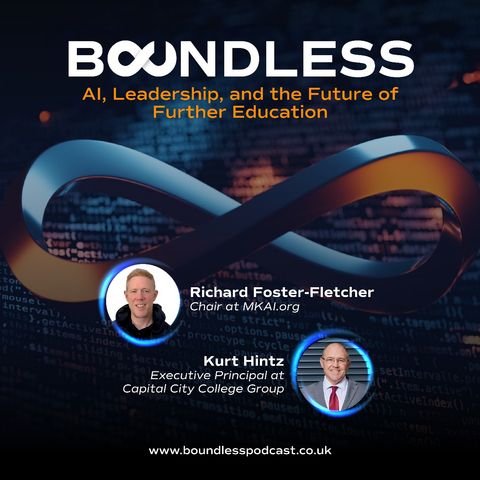Ep 1. AI and Personalised Learning - Series: AI, Leadership, and Further Education

Sign up for free
Listen to this episode and many more. Enjoy the best podcasts on Spreaker!
Download and listen anywhere
Download your favorite episodes and enjoy them, wherever you are! Sign up or log in now to access offline listening.
Ep 1. AI and Personalised Learning - Series: AI, Leadership, and Further Education
This is an automatically generated transcript. Please note that complete accuracy is not guaranteed.
Description
New series: Artificial Intelligence Leadership and the Future of Further Education With: - Richard Foster-Fletcher, Executive Chair MKAI.org - Kurt Hintz, Executive Principal, Capital City College Group Episode 1: AI...
show moreWith:
- Richard Foster-Fletcher, Executive Chair MKAI.org
- Kurt Hintz, Executive Principal, Capital City College Group
Episode 1: AI and Personalised Learning: Exploring how Artificial Intelligence might enhance the individualised learning experience
Episode Notes:
Kurt Hintz and Richard Foster-Fletcher discuss their roles in AI implementation in education, with Kurt taking on an educational leadership role and expressing concerns about its implementation. Both participants express support for AI but acknowledge the need for careful consideration in its use.
Kurt shares his background as an educator and his interest in using technology to maximise the potential of education. Richard explains his motivation for working in AI and the need to navigate complex scenarios with the help of AI. They both emphasise the importance of preparing students for jobs that may not even exist yet due to rapid advancements in AI. Richard discusses the impact of artificial intelligence (AI) and ChatGPT on education. He highlights how students can use AI to write essays, create marketing materials, and develop business plans.
Kurt emphasises the need for educators to adapt to this technology and ensure that students are at the forefront of its usage. They discuss how AI tools can enhance productivity without necessarily replacing jobs entirely. They also explore the shifting importance of knowledge in a world where information is readily accessible through technology. The conversation touches on future episodes that will delve into topics such as personalised learning, harnessing technology in education, future-proofing institutions, and data privacy concerns.
Richard discusses the balance between natural human capabilities and learned behaviours in dealing with a larger number of people. He asks if having smart glasses that identify people's names and information would be useful or intrusive. Kurt expresses his enthusiasm for such technology, as it would help him remember names and personalise interactions. They discuss the expectations of knowing people's names in a large organisation and how personalisation can enhance relationships. Kurt suggests that AI skills are becoming essential in various industries, including education, and educators need to incorporate these skills into their teaching.
Richard highlights the potential challenges of generative AI tools like text generation but also recognises their value when used creatively by skilled individuals. They emphasise that AI is just a tool that complements human creativity and thinking. The conversation touches on job displacement concerns but also presents opportunities for those who adapt to new technologies. Lastly, they mention the importance of personalisation in classrooms and introduce the topic of personalisation basics.
Richard and Kurt discuss personalised learning and the potential impact of AI on it. Personalised learning involves having a personal coach who provides constant feedback and support. It aims to adapt teaching methods to each student's individual needs and pace. The traditional model of personalised learning existed in apprenticeships, where individuals received one-on-one guidance. However, implementing this in a classroom with multiple students is challenging but possible through differentiation. AI can potentially enhance personalised learning by constantly measuring an individual's progress against competency frameworks, eliminating the need for point assessments. This approach allows for continuous measurement of skills and abilities at an individual level.
The discussion also addresses whether traditional assessment methods adequately prepare individuals for real-world work environments that involve deadlines and consistent performance over time. Additionally, the conversation highlights how AI tools can support teachers by reducing their administrative workload related to assessments, allowing them to focus more on building strong relationships with their students.
Information
| Author | Richard Foster-Fletcher |
| Organization | Richard Foster-Fletcher |
| Website | - |
| Tags |
Copyright 2024 - Spreaker Inc. an iHeartMedia Company
